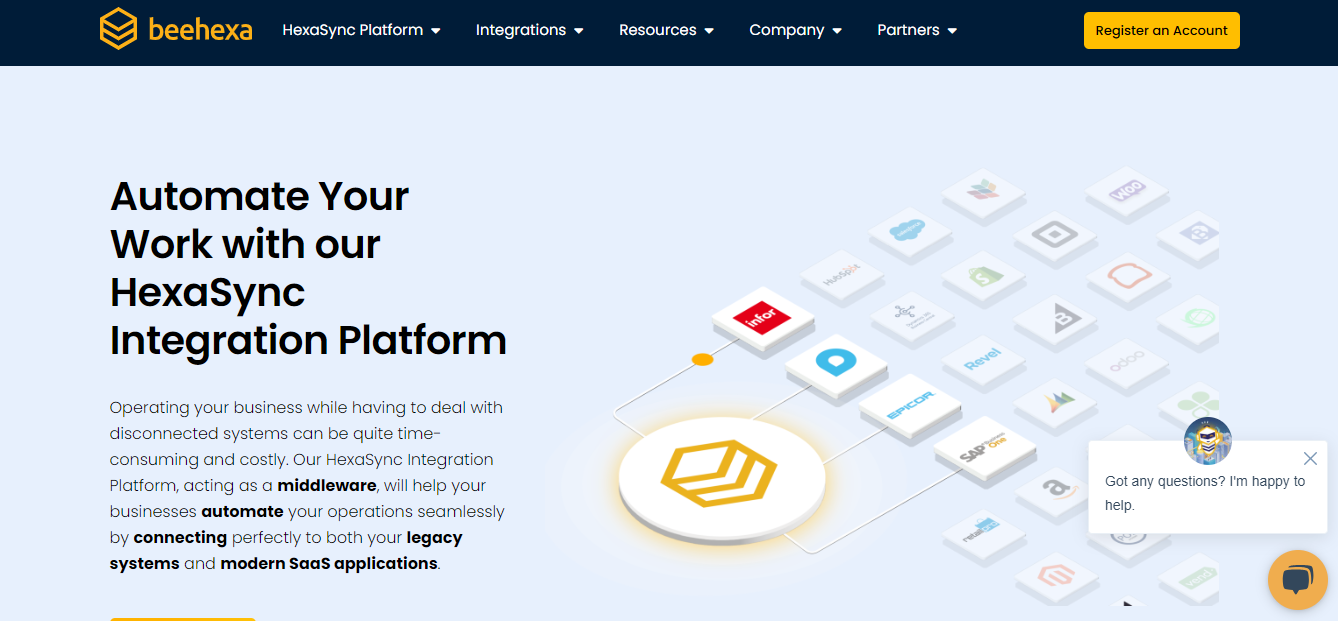
The Gartner Future of Sales 2025 report predicts that 80% of B2B sales interactions between suppliers and buyers will occur in digital channels by 2025. As global sales activities are gradually shifting from traditional channels to online methods, businesses in general, and B2B companies in particular must race to meet customer expectations and maintain competitiveness. B2B integration has emerged as a revolution, helping wholesalers automate sales processes, improve data accuracy, and optimize business operations. This article highlights the top five benefits of B2B integration and helps readers gain a better understanding of them.
What is B2B Integration?

B2B integration is the synchronization of processes and data from different B2B systems to optimize operations and unify the data of a B2B business. This integration helps businesses improve the efficiency and effectiveness of sales operations by ensuring that all B2B systems, such as ERP, CRM, eCommerce, etc., work seamlessly together.
According to Next-Generation B2B Integration Enables a Digital-First, Resilient Supply Chain survey by OpenText, 78% of businesses say that digital B2B integration has improved the overall performance of their supply chain, with 40% noting significant improvements. The main benefits include reduced costs, faster responses, and higher customer satisfaction. Digital Commerce 360 also shows that companies that provide consistent digital experiences across channels, supported by ERP-eCommerce integration, reported a 62% increase in product sales and service. The above figures reflect the extreme benefits of B2B integration for businesses today.
Types of B2B Integration Solutions

On-premise B2B Integration Solution
On-premise B2B integration solutions are types of integration deployed and installed on private internal servers of organizations and businesses. Instead of being hosted in a remote data center or cloud environment, businesses deploying on-premises B2B integration software own and manage the integration project, simply paying licensing fees to the vendor. provided every year.
Deploying projects in this way provides better control and management compared to other types of integration, but the main barriers that businesses face are their budget limitations and the number of resources.
Cloud B2B Integration Solution
Cloud integration is a type of B2B integration solution that uses the cloud infrastructure of a third-party cloud provider to connect and automate B2B systems. With these B2B integration solutions, you need to use the Internet to access your needed services. Compared to on-premise integration, this type does not require paying license fees; you only pay a subscription fee when using the service.
Cloud B2B integration is gradually becoming popular as companies can save budget and manpower by not having to operate their own IT infrastructure.
Hybrid B2B Integration Solution
Hybrid B2B integration is a solution that includes on-premise and cloud integration. This combination allows businesses to flexibly and efficiently leverage the strengths of both methods.
According to Skyquest, the global hybrid integration platform market was valued at $35.49 billion in 2023 and is expected to grow to $87.88 billion by 2031, with a CAGR of 12% during the forecast period (2024-2031). Meanwhile, the global cloud integration market is projected to grow by $8.32 billion during the period 2022-2026, with a CAGR of 12.3% during the forecast period (according to GlobeNewswire).
B2B Integration Features

Through integrated B2B solutions, businesses can monitor and analyze data from a single source even though they have to manage huge volumes of data. Additionally, with the reporting feature of integrated B2B software, wholesalers can identify processed and unprocessed jobs and understand the status of their sales. Another feature of B2B integration is data normalization, where data in various formats, such as EDI, XML, and JSON, is also converted into a common format for easier processing.
Today, thousands of different types of documents are exchanged, and each industry has developed its own EDI technology to meet its specific needs. B2B integration solutions are compatible with various industry standards to ensure seamless integration between different industries and partners, enhancing interoperability between organizations. Additionally, B2B integration providers use protocols such as AS2, SFTP, and HTTPS to transmit data to help ensure data security and compliance with regulatory standards, protecting the sensitive business information of customers.
Furthermore, B2B integration allows companies to expand integrations as their business grows and scales in the future. With this feature, users do not need to search and deploy new solutions but simply add modules and integration features.
Top 5 Benefits of B2B Integration

B2B integration takes business operations to the next level. Here are 5 key benefits of B2B integration:
Cost Saving
The primary benefit of B2B integration is a significant reduction in labor and material costs as businesses streamline business processes and minimize manual tasks such as data entry, sorting and mailing, and preparing documents.
Furthermore, B2B integration supports faster transaction processing as employees can process orders in real-time, ensuring orders are fulfilled on time, and increasing customer satisfaction. Improving processing speed also helps businesses maintain a more stable cash flow, which is also crucial to maintaining operational stability.
Improved Data Accuracy
At a basic level, B2B integration eliminates the need for manual data entry, minimizing errors related to data input. This helps ensure greater data integrity and reliability, supporting the development of strategies and decision-making.
In fact, with B2B integration, data accuracy improves in many ways when the data exchanged between businesses and their partners is consistent. Both parties can access the same, up-to-date information, greatly reducing the risk of miscommunication.
Enhanced Efficiency
Perhaps the most important benefit of B2B integration is enhanced efficiency. Improving the speed of order processing, invoicing, or inventory management through automation helps businesses minimize errors, allowing them to focus on more strategic tasks, thereby increasing overall efficiency. With the improved speed, operational efficiency and cooperation between partners are also tightened. Customers also experience the best purchasing process.
According to IBM, the benefits of B2B integration that IBM brings to customers include 35% faster revenue recognition and 48% faster document delivery times. The platform features four hybrid cloud software components that simplify your critical EDI interactions with customers, suppliers, distributors, and other trading partners.
Improve Visibility and Control
One of the benefits of B2B integration is increased supply chain visibility from order to delivery over time. Businesses can monitor more easily with this quick visibility, thereby minimizing potential disruptions to ensure the supply chain runs more smoothly.
Furthermore, B2B integrations can provide a variety of reporting tools that allow wholesalers to track and measure performance.
Stronger Partner Relationships
By seamlessly connecting business B2B systems with partners, B2B integration helps businesses enhance communication channels with their partners. Real-time synchronization allows all parties to have access to the same information, reducing misunderstandings and improving strategic coordination and shared goals.
With better visibility through integration, this transparency builds trust with partners and enhances the customer experience. Also according to IMB statistics, using their B2B integration helps customer satisfaction increase by about 49%.
The Challenges of B2B Integration

In addition to the significant benefits of B2B integration, businesses implementing it will also face several challenges, such as:
- Integrating multiple complex systems makes the integration process time-consuming and expensive.
- B2B integration demands high technical expertise, which requires finding and maintaining skilled personnel.
- There are security concerns with B2B integration related to the exchange of sensitive and critical information such as financial records and customer data.
- High costs are involved in investing in infrastructure, initial setup, and continuous maintenance.
- Different partners and businesses may use various data standards and protocols, necessitating the use of data mapping and transformation tools to ensure compatibility.
- B2B integration systems must adapt flexibly to new technologies as the business environment continuously evolves.
- Ensuring consistent and accurate data across multiple systems is also a significant challenge.
- Effective implementation requires coordination between different organizational departments and consistent collaboration with partners.
The Future of B2B Integration

B2B integration is evolving rapidly, which means constant improvements and changes are required for this solution. Here are some future directions for B2B integration platforms:
- Increased adoption of cloud-based solutions: Cloud integration enables seamless integration without the need for extensive on-premises infrastructure. Besides, it offers flexibility and significant cost savings.
- Utilization of Artificial Intelligence (AI): AI will be integrated into B2B platforms to enhance automation, data analysis and improve decision-making processes. In particular, AI can predict trends, identify anomalies, and optimize supply chain operations.
- Collaboration tools: Business users can use advanced collaboration features, such as integrated project management tools, shared dashboards, or real-time communication channels, facilitating better coordination between that company and its partners.
- Connect anytime, anywhere: Carrying cloud integration solutions allows users to exchange data and collaborate anytime, anywhere without any geographical distance barriers.
Why Choose HexaSync for B2B Integration?

HexaSync is an integration platform that acts as middleware and connects multiple B2B systems through APIs. This platform has been connecting more than 100 different B2B systems from SaaS to legacy, including eCommerce, ERP, CRM, Accounting, Marketplace, Chatting App, and more.
With customization features tailored to customer needs, HexaSync can synchronize tasks from basic (products, sales orders, customers, inventories) to complex (loyalty, gift cards, promotions, etc.). When a business needs to expand their integration, HexaSync will support customers to continue synchronization without having to start from scratch.
One of the big advantages of using HexaSync is that it does not require customers to have technical knowledge. In addition to providing requirements and credentials, HexaSync will handle it all. After deployment, if any errors arise, the HexaSync team will provide immediate support. In particular, the platform runs on Microsoft Azure infrastructure, ensuring the stability and security of customer data.
Conclusion
In short, the benefits of B2B integration are evident due to its excellence in driving business operations and strategic growth. From saving costs and increasing efficiency to improving data quality and promoting communication, these advantages have a powerful impact on the development of a company. Investing in integrated B2B solutions is a key strategy for businesses looking to expand in today’s rapidly growing digital transformation era.